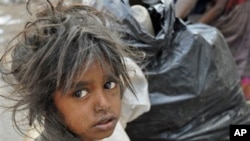India has formally launched an ambitious program to provide identification numbers to its population. Authorities say they plan to put ID cards in the hands of 100 million of India's poorest citizens within months, making it easier for them to access basic services.
Indian officials set a festive mood for the new plan, with Prime Minister Manmohan Singh and Sonia Gandhi, leader of the dominant Congress Party, personally handing out the first identification cards to villagers in Maharashtra state. The government has set an ambitious deadline, aiming to provide hundreds of millions of people with a unique 12-digit number within just a few years.
Officials say the numbers and the data profiles behind them will offer a fast track for India's poorest citizens to benefit from a wide range of services, from food distribution to banking.
The project is a top priority for the government, says Prime Minister Singh, adding that India's most economically and socially backward citizens will derive the maximum benefit from the new plan.
The poorest of the poor in India frequently have difficulty obtaining the right paperwork to certify their identity, and receive government benefits. The new digitally encoded ID cards contain key biographical data, backed up by fingerprint and retinal scans.
Congress Party leader Sonia Gandhi says the objective is not just progress, but inclusiveness of everyone in the country. Gandhi said officials are aware the challenges of the 21st century cannot be overcome by old ideas and methods. The goal, she says, is to empower the people.
India leveraged its human talents in information technology to advance the identification program. The government appointed billionaire founder of Infosys Corporation, Nandan Nilekani, to lead the initiative. He, in turn, recruited Indian tech talent from companies around the world to volunteer their time on the project.




